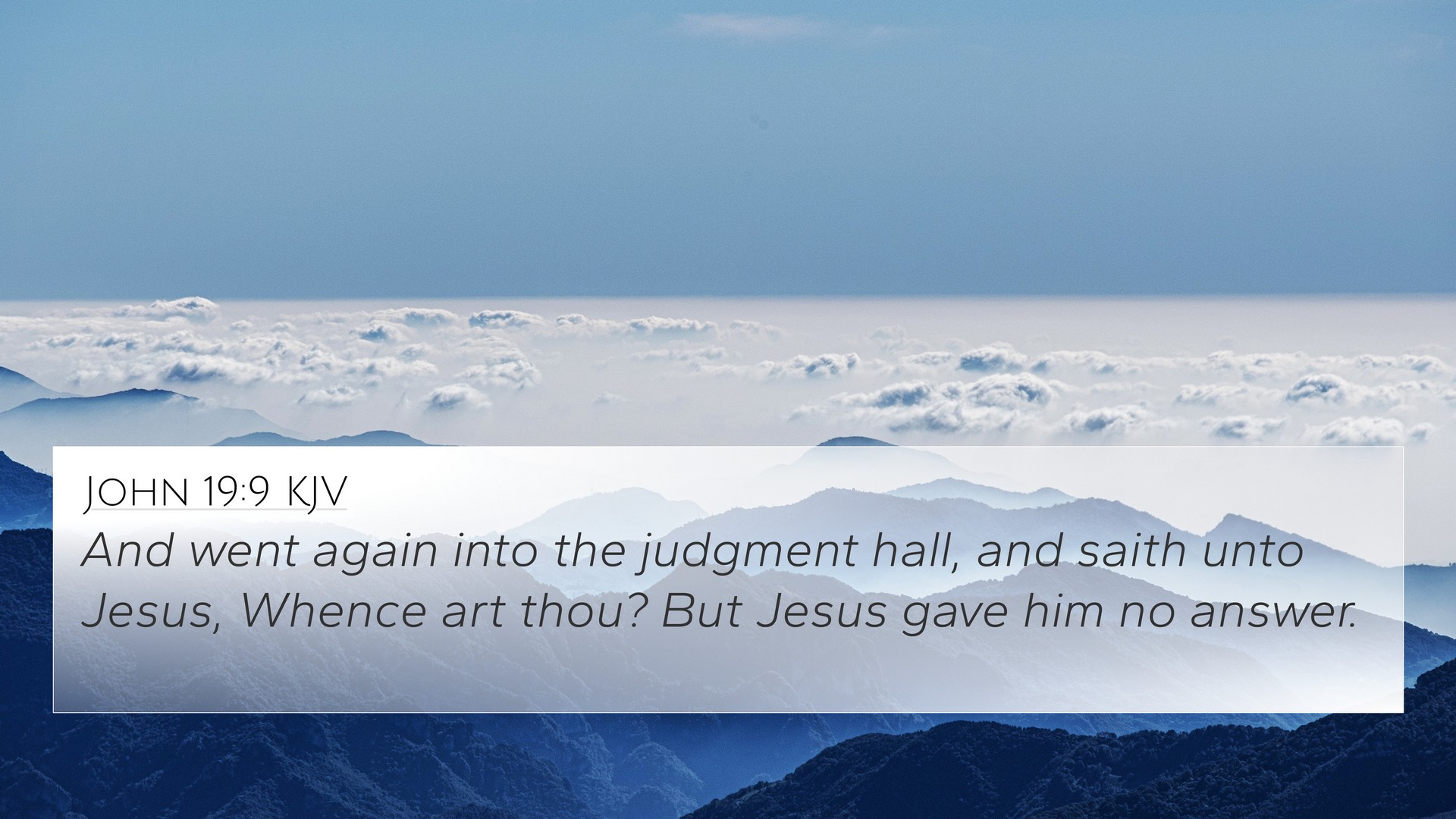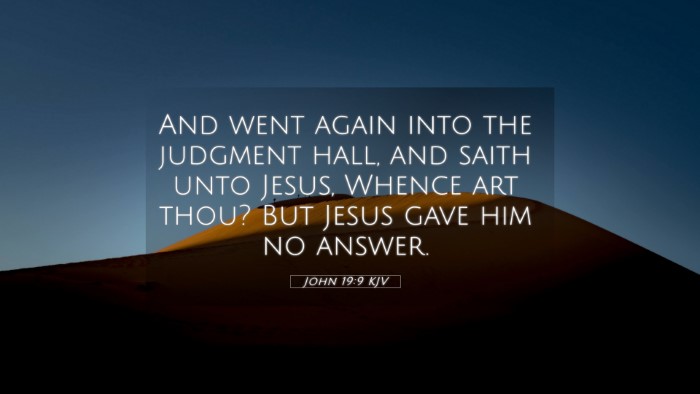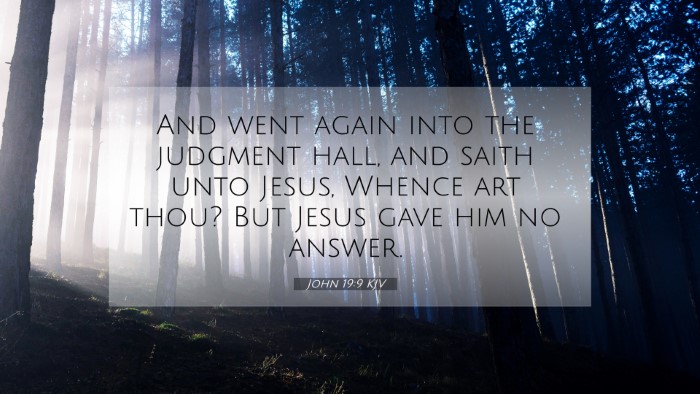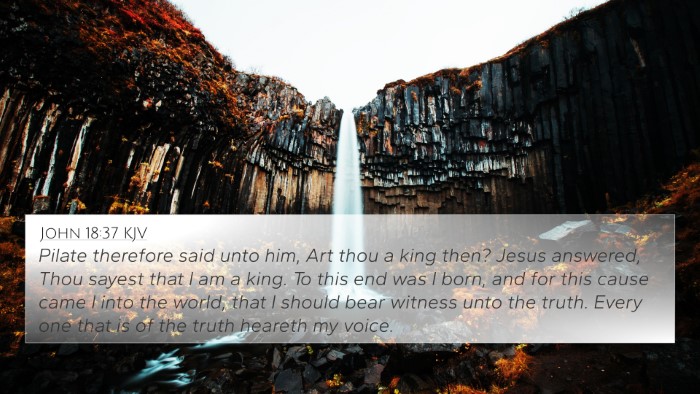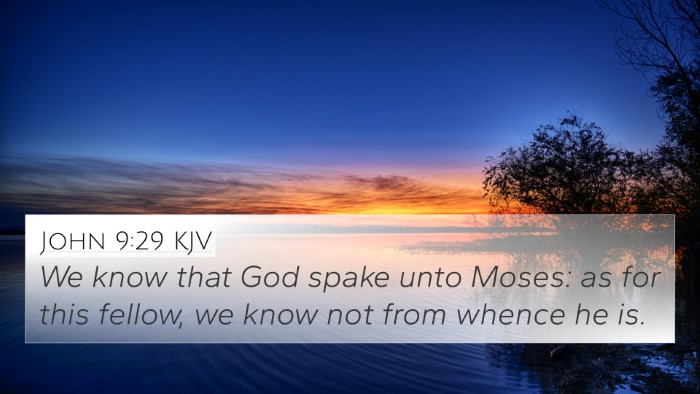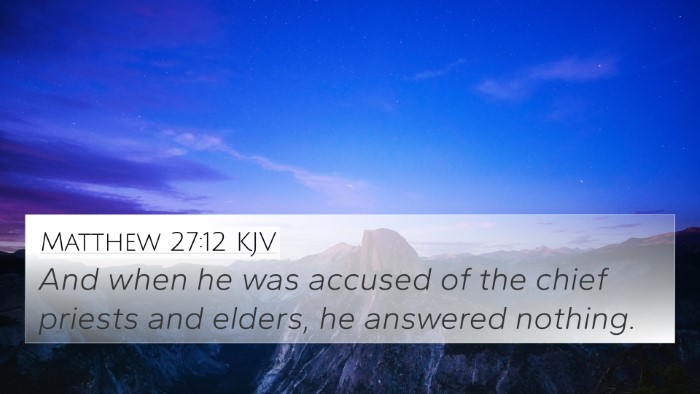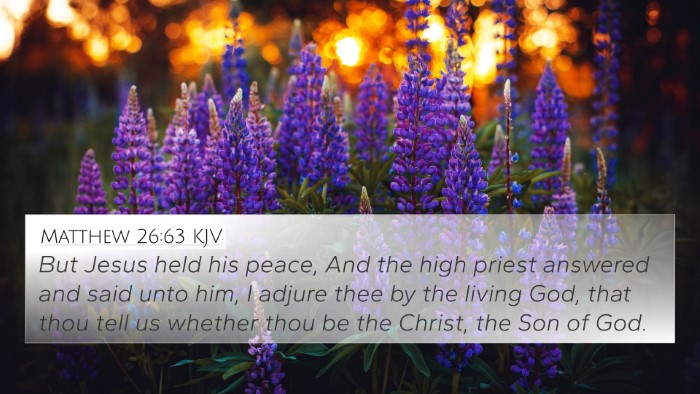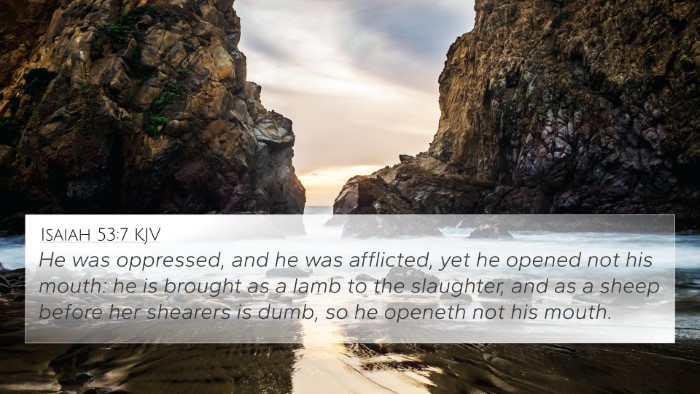Understanding John 19:9
Bible Verse: John 19:9 - "And went again into the judgment hall, and said unto Jesus, Whence art thou? But Jesus gave him no answer."
Overview
In John 19:9, the narrative captures a pivotal moment during the trial of Jesus before Pontius Pilate. The inquiry made by Pilate seeks to discern the origins of Jesus, highlighting his power as a Roman official juxtaposed against the silence of Jesus, which emphasizes his sovereignty and fulfillment of prophecy.
Commentary Insights
-
Matthew Henry:
Henry emphasizes that Pilate's question reflects a mixture of curiosity and authority. He points out that Pilate, as a Roman governor, was perplexed by Jesus' demeanor and the lack of defense from Him. This silence serves a purpose, as it shows that Jesus is fulfilling God's plan rather than merely defending Himself.
-
Albert Barnes:
Barnes notes the significance behind Pilate's question. He asserts that Pilate's inquiry into Jesus' origins hints at his recognition of the fact that Jesus was no ordinary man. The absence of a response from Jesus implies a deeper knowledge of His divine mission, reinforcing the concept that His kingdom is not of this world.
-
Adam Clarke:
Clarke elaborates on the idea that the silence of Jesus held deep theological meaning. He explains that Jesus’ lack of response was not a sign of weakness or defeat; instead, it corroborates His prior statements about His destiny and the fulfillment of scripture, thus encouraging believers to find strength in trials.
Thematic Connections and Scripture Cross-References
John 19:9 is rich with implications that can be further understood through other biblical passages. Below are key cross-references that elucidate the themes found in this verse:
- Isaiah 53:7: "He was oppressed, and he was afflicted, yet he opened not his mouth..." - This connects to the silence of Jesus, illustrating the prophetic nature of His suffering.
- Matthew 27:12-14: "And when he was accused of the chief priests and elders, he answered nothing..." - This recounts the silence of Jesus before His accusers, linking back to Pilate's inquiry.
- Luke 23:9: "Then he questioned him with many words; but he answered him nothing..." - Another example of Jesus' silence before authority, affirming His role in redemptive history.
- John 18:36: "Jesus answered, My kingdom is not of this world..." - This verse reveals the nature of Jesus' kingship, echoing themes from John 19:9 regarding His origins.
- John 1:10-11: "He was in the world, and the world was made by him, and the world knew him not..." - This passage reflects on the rejection Jesus faced, corresponding with Pilate’s confusion.
- Philippians 2:7-8: "But made himself of no reputation, and took upon him the form of a servant..." - Illustrates the humility of Christ, which is symbolized in His silence before Pilate.
- Hebrews 5:7: "...who in the days of his flesh, when he had offered up prayers and supplications..." - Reminds us of Jesus’ reliance on God during trials, emphasizing the spiritual significance behind His silence.
Comparative Bible Verse Analysis
The understanding of John 19:9 can be enriched by comparing and contrasting it with verses from both the Old and New Testaments. Here’s how some significant connections can be made:
- Comparative Study of Silence: Analyzing the profound silence of Jesus against the backdrop of human expectation of defense in Jeremiah 11:19, where the prophet is described as like a lamb led to slaughter.
- Linking Prophecy and Fulfillment: Exploring the connections to Old Testament prophecies about the Messiah, such as Psalm 38:13-15, underscores His commitment to God’s will amidst adversities.
- Inter-Biblical Dialogue: The echoes of Jesus’ character can be traced throughout the scriptures, including the teachings and reactions of the early church as noted in Acts 8:32, relating to the obedient Lamb.
The Importance of Cross-Referencing in Bible Study
Cross-referencing Biblical texts enriches the understanding of verses like John 19:9. Here are some tools and methods for effective cross-referencing:
- Bible Concordance: A useful resource for finding terms and their occurrences throughout the Bible.
- Cross-Reference Bible Study: An approach that integrates various scriptures to provide comprehensive insights into a single verse.
- Bible Chain References: A technique that connects related verses together to create a thematic flow for deeper understanding.
Conclusion
Through examining John 19:9 alongside various commentaries and cross-references, one can appreciate the theological depth and narrative significance of this moment in scripture. The silence of Jesus speaks volumes about His mission and the fulfillment of prophecy, inviting believers to reflect on the weight of His sacrifice and the power of His identity as the Son of God.
Further Study Suggestions
To enhance your study on this verse, consider:
- Exploring the Gospel accounts of Jesus' trial for varying perspectives.
- Engaging in thematic studies on the concept of silence in the context of suffering and faith.
- Utilizing online Bible study tools for deeper exploration of related scriptures.
Keywords and Their Relevance
Understanding the connections of John 19:9 extends into a broader conversation about:
- Bible verse cross-references for contextual clarity.
- Connections between Bible verses to reinforce biblical themes and doctrines.
- Cross-referencing Biblical texts which allows for a greater appreciation of scripture as a unified message.
